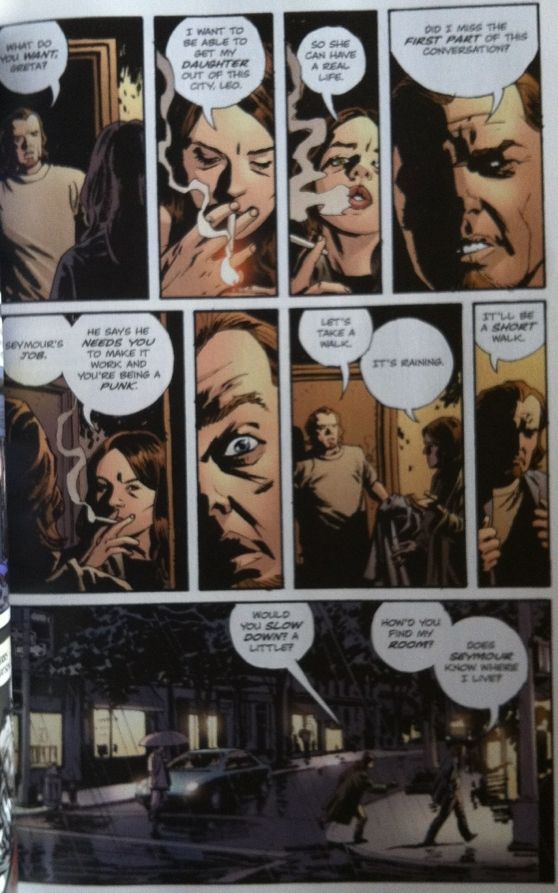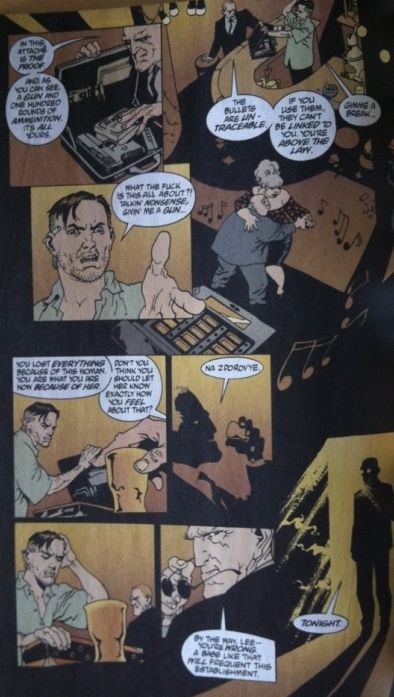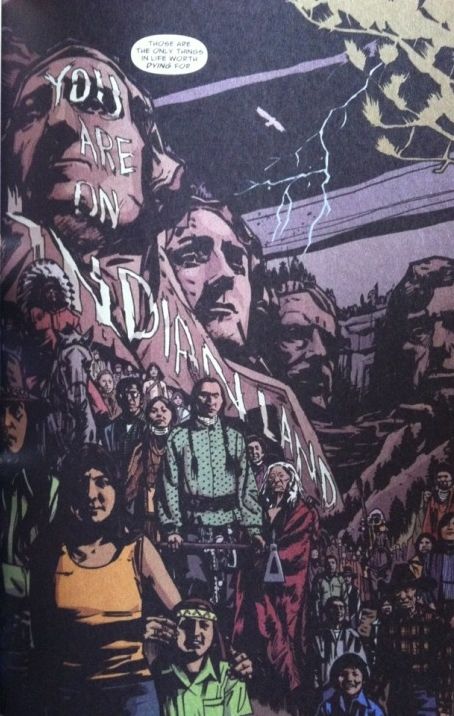Or how Criminal, 100 Bullets, and Scalped implicate the reader to generate a guilty response.
Comics by Ed Brubaker and Sean Phillips, Brian Azzarello and Eduardo Risso, Jason Aaron and RM Guerra with others.
I really like Crime Comics. There is just something about the gritty, intense world of people living outside the law that is endlessly fascinating and shockingly entertaining. Now there are probably endless reasons why these comics are so compelling... but looking at some of my favourite examples I think I've figured out one of the genre's key genetic elements.
Guilt.
Guilt is an emotion that I have a complicated relationship with. Whether its competent parenting, a Roman Catholic education, or some fluke of genetics I feel an overwhelming and insistent sense of SHAME whenever I think of certain mistakes I've made. Just writing this I'm probably turning a bit red. My point is that for me guilt is an exceptionally powerful emotion. It's a thing I feel deep down in the bowels of my stomach, something that chills the skin and tightens my back and gives me the weirdest sweats. It's lurid and disgusting and probably one of the handful of strongest emotions I feel.
And the best Crime comics make me feel guilty in spades.
(I've tried to keep this *SPOILER* light, but you know, procede at your own peril.)
Criminal is the absolutely masterful Crime series by Ed Brubaker and Sean Phillips. Criminal is not so much a series of Crime stories as a WORLD of crime stories populated by granular characters living in an uncompromisingly realized world. You don't so much read these comics as visit them and get blood and grit all over yourself. And part of what makes this experience so engrossing is how Brubaker and Phillips use guilt and culpability.
One of the key components of the Criminal forumla to me is perversely abused empathy. Most of the protagonists in the Criminal stories are, despite their flaws, immensely likeable. Despite knowing that these characters are thieves and thugs and murderers we end up sympathizing with them despite ourselves. This sympathy slowly turns to empathy and we soon find ourselves actively rooting for our protagonists to succeed at whatever their unlawful enterprise is. As the story unfurls, best laid plans are ruined, and the terrible consequences of the protagonists choices become clear we see the fallout of what we wanted. We realize we too are culpable: by actively rooting for the lead character we have become accomplices. And therefore we feel the lurid weight of guilt.
100 Bullets is another great Crime comic by Brian Azzarello and Eduardo Rizzo. Filled with intrigue, conspiracy, murder, and some of the most aggressively flawed characters I have encountered, 100 Bullets is a sprawling comic that revels in the excesses on the edges of society. It's mercilessly written and filled with horrendous images rendered by the exquisite, and beautiful line of Eduardo Risso. But, at the end of the day, one of the most brilliant things in this comic is 100 Bullet's opening premise and how effectively it evokes guilt in the reader.
Throughout the introductory chapters of 100 bullets we see the shadowy Agent Graves approach characters with a brief case and an opportunity. Inside this briefcase is a clean handgun, 100 bullets of untraceable ammunition, and incontrovertible proof that someone who has deeply wronged the character receiving the briefcase is guilty. With these items comes the promise of total immunity from prosecution if said character decides to act on this opportunity The character then invariable pursues this chance for vengeance in some way and carries through the morality experiment to some sort of conclusion. As a hook it's absolutely perfect.
This premise is also an absolutely perfect way of nabbing the reader and making them culpable in the protagonists decisions. When presented with the scenario, carte blanche to enact justice and the reality of the crimes committed, we can't help but game it out for ourselves. What would you do in the characters' shoes? Would you kill the guilty person if he had you falsely imprisoned? What if he murdered your wife? Raped your daughter? Or could you stop yourself out of some higher moral obligation? By mentally playing these situations out and deciding that vengeance is justified we become just as guilty as the character in the comic when they decide to go through with it. And in doing so, the consequences of their actions become the consequences of our own decision. And so we feel that lurid weight of guilt.
Scalped is another astounding Crime comic by Jason Aaron, RM Guerra, and various collaborators (art above is by Jean Paul Leon). Scalped tells the story of crime on an American Indian Reservation. It is easily one of the most tense, brutal, and heart-pounding reads I've ever enjoyed. It also contains one of the most effective and intelligent uses of reader evoked guilt in comics.
Let me explain. If you are a North American who isn't a full-blooded aboriginal (First Nations if you're Canadian) then you are heir to a pretty awful legacy. We are, all of us, living on land stolen from the people who inhabited it. People who our governments and ancestors swindled, crushed in wars, and basically attempted to commit genocide against. (HBC, Canada's oldest company sent smallpox laced blankets to Canadian First Nations... for instance.) And even after killing the majority of these people and displacing the rest, we, as a society, attempted to wipe out their culture. As if all of this wasn't disgusting enough, we still treat North American aboriginals horrendously, leaving them in far too many cases disenfranchised, marginalized, and impoverished. It's fucking disgusting, and to a certain extent we are all complicit in this. We are all of us guilty.
The thing that Scalped does, beyond displaying how horribly we have betrayed these people, is frame the events portrayed in relation to our guilt. Basically, every awful thing that happens in Scalped is our fault: the situations, the poverty, the desperation everything is a result of the sins of our past. And so for every crime, every murder, every horrendous thing in Scalped we are all preemptively guilty. And for that reason we experience a much more intimate, visceral, and immediate feeling of guilt. It's hugely effective.



No comments:
Post a Comment